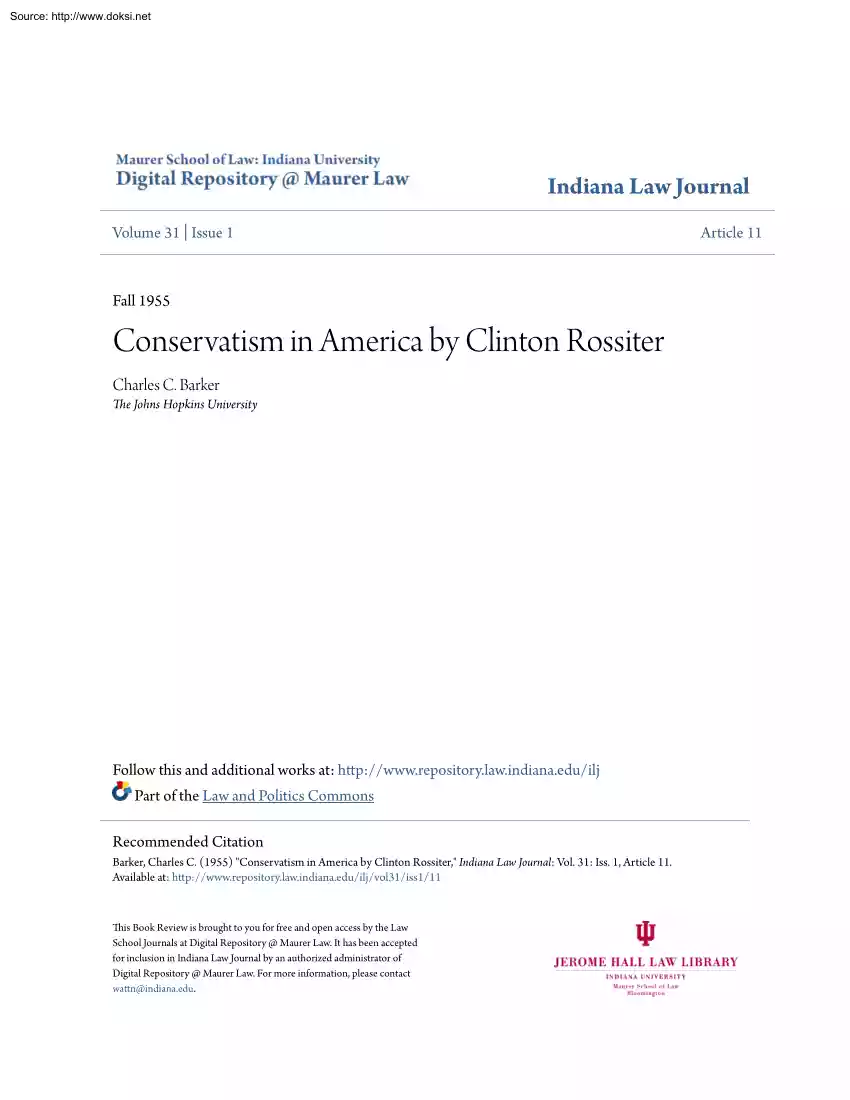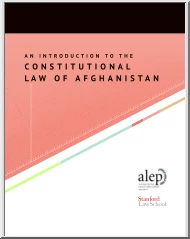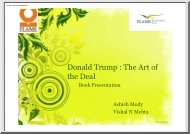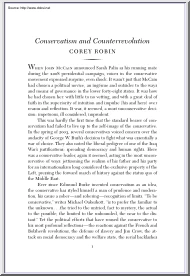A doksi online olvasásához kérlek jelentkezz be!

A doksi online olvasásához kérlek jelentkezz be!
Nincs még értékelés. Legyél Te az első!
Mit olvastak a többiek, ha ezzel végeztek?
Tartalmi kivonat
Source: http://www.doksinet Indiana Law Journal Volume 31 | Issue 1 Fall 1955 Conservatism in America by Clinton Rossiter Charles C. Barker The Johns Hopkins University Follow this and additional works at: http://www.repositorylawindianaedu/ilj Part of the Law and Politics Commons Recommended Citation Barker, Charles C. (1955) "Conservatism in America by Clinton Rossiter," Indiana Law Journal: Vol 31: Iss 1, Article 11 Available at: http://www.repositorylawindianaedu/ilj/vol31/iss1/11 This Book Review is brought to you for free and open access by the Law School Journals at Digital Repository @ Maurer Law. It has been accepted for inclusion in Indiana Law Journal by an authorized administrator of Digital Repository @ Maurer Law. For more information, please contact wattn@indiana.edu Article 11 BOOK REVIEWS is a form of political ifrsponsibility that leaves to administration and adjudication the tasks of determining policy that should have been performed by statutory
provision. Insofar as this work calls for examination of, and vigilance against, this kind of "delegation" it is on sound ground. IVAN C. RUTLEDGEt Source: http://www.doksinet CONSERVATISM IN Alfred A. Knopf AMERICA. 1955. By Clinton Rossiter. New York: Pp. xii, 327 $400 With this book we may have reached the crest of a wave in presentday political sentiment. The mountainous swell of conservatism, which makes the startling difference between American politics now and before the war with Japan and Germany, has by this time accumulated a considerable mass of intellectual-as well as emotional and voting-content. To discuss the contemporary conservative intellect broadly, certain journalists would have to be included and so of course would a handful of statesmen. But today's phrase, "the new conservatives," is used to indicate an academic element such as appears infrequently in American political thought. It is rather with the writings of a couple of
historians than with more general political expression that the new work by Professor Rossiter, himself a political scientist, suggests comparison. Six years ago Peter Viereck of Mount Holyoke, who teaches European history and who is also a distinguished poet, reminded us in Conservatism Revisited that the epoch of Metternich, which is commonly identified with black reaction and suppression, was in truth no worse than half bad, and that it did have certain saving graces. This bright book urges that the tranquilizing influences, which restrained awhile the disruptive forces of nationalism in Europe, are worth understanding, even imitating, in our own still more perilous period. More recently Russell Kirk's Conservative Mind and A Program for Conservatives have increased the weight of academic conservatism. As Rossiter notices, this scholar is quite Tory in spirit His Burkean sentiments and his interest in the history of English as well as American thought give him, though in less
degree than Viereck, an international rather than a national approach to conservative thinking. Rossiter is the American nationalist of the company of the new conservatives. He does not pretend to be happy about some of the t Professor of Law, Indiana University School of Law. Source: http://www.doksinet INDIANA LAW JOURNAL neighbors he has to put up with by reason of his having taken residence on the Right. He confesses that he is "alarmed by the confusion of thought, excess of emotion, and irresponsibility" 1 he discovers there; and he has said in a communication to a magazine that he does not know whether he is a liberal conservative or a conservative liberal. Thus the new book, though in passages it is sentimental about community and tradition, does include a strong affirmation for freedom-old-style liberalism at least. American conservatism should incorporate as its own the liberal tradition, according to Rossiter. The author pays his respects to international
intellectual Conservatism at the outset-he honors it with a capital C, and so distinguishes it as a way of thinking from conservatism with a small c, which is the form he uses to refer to any one nation's domestic movement. Though it would be pointless to repeat his twenty-one-item recapitulation of Conservatism, the following broken quotations represent concepts with which the author seems to be sympathetic, and to which he recurs, sometimes to amend and develop, throughout the book: The natural inequality of men, except in the equal possession of a precious soul and inviolable personality. . . . The in- evitability and necessity of social classes, and consequent folly and futility of most attempts at leveling. . . The prime im- portance of private property for liberty, order and progress. The essential role of religious feeling in man and organized religion in society. The civilizing, disciplinary, conserving mission of education The mystery, grandeur, and
tragedy of history, man's surest guide to wisdom and virtue . The existence of immutable principles of universal justice . The primacy of the community . over the whims and rights of any individual. The absolute necessity of Conserva- tism-as temperament, mood, philosophy, and tradition-to the existence of civilization.2 Starting from a Conservatism more conservative than the tradition he examines at home, Rossiter works his way by procedures at first analytical, then historical, and finally logical and hortatory. He follows the introductory chapter on the Conservative tradition with an analysis of the reciprocity between conservatism and liberalism in American thought; then he moves into an historical survey which comprises half the book. John Adams and John C Calhoun appear as Rossiter's particular heroes of conservative thinking, while Alexander Hamilton is 1. 2. P. 4 Pp. 61-62 Source: http://www.doksinet BOOK REVIEWS rejected as too materialistic to be a hero and
the Carey school of nationalistic-and-welfare economists is overlooked altogether. The second historical chapter explains very clearly the reasons why American economic individualism, which became so entrenched in our business mentality three-quarters of a century ago, should be understood in the long view as an aberration in the conservative tradition-and why it is not the most natural form of conservatism in the world, as Americans often assume it to be. The third and final historical chapter confirms an earlier finding that, though Franklin D. Roosevelt may be called a conservative and sometimes described himself so, he was more truly a liberal and reformer. This is a piece of self-denial by the author which he seems wise to make. On the other hand, Eisenhower meets the specifications of conservatism quite consistently Rossiter's analyses in the concluding chapters draw together his anxieties and hopes. His standards of morality eliminate from the company of true conservatives
all of America's extreme and intolerant Right His spirit of moderation prevents his "Conservative Program for American Democracy" from becoming a manifesto, and from being ideological in tone. He asks simply: for dedication to the public service in the spirit of Conservatism; for honoring liberty, in the sense of free opportunity to create and to become secure; for a universal deep respect for the community, and for an appreciation of this nation as a framework of voluntary communities. A gradualist in all things, in education Rossiter is less opposed to instrumentalism than conservatives usually are He would have "a steady course down the middle-between Deweyites and anti-Deweyites, vocationalists and generalists," ' and so on. As for the role of religion, while acknowledging that conservatives generally prefer an established state church he pursues that line of thought nfo farther, and he concludes with a plea that conservative thinkers "tell us why
our liberties need the support of a God-centered tradition," and that they "carry on the progressive discovery of the commands of the higher law."' When they have had their say and the jeremiads have echoed into quiet, the burden of the new conservatives' desire seems to be: Let us abide by our deeper traditions. This anxiety points up a curious blindspot in the scholars They seem to blank out from their vision the special traditionalisms of America which they might judge to bear weight. The Supreme Court as a Sanhedrin, drawing on an idealism the same in principle as Rossiter himself pronounces; the local patriotisms of most 3. P 284 4. P 271 Source: http://www.doksinet INDIANA LAW JOURNAL regions and places wherever Americans live; our national preoccupation with what has recently been criticized as the "American prototype" in making domestic and foreign policy; the American Civilization movement in the universities and out; the present
resurgence of religion, and so on. The present reviewer chances to have participated in some of these things and to be in sympathy with certain others (by farther coincidence, not very different from Professor Rossiter). One does not have to oppose all or many of the specific items for which the new conservatives stand, in order to object to the general line of their sentiment. The question is one of emphasis and urgency. One trouble with the new conservatives lies in their failure to realize of themselves that the new conservatism is essaying precisely the kind of effort they criticize the liberals for making. They object to the habit of whirl; they condemn the reformer's intention But Conseruatism in Anwrica, not different from Russell Kirk's history, is itself too hurried to be very well written; its emotion expresses itself too often in the first person singular and the accusative; and if ever any intellectual group wished to reform an American attitude, Viereck, Kirk,
and Rossiter have joined the march. Allowing as obvious, as a correct part of any American's faith, Rossiter's paradoxes that liberalism should be incorporated in conservatism and that freedom needs to be guarded and entrenched, the liberal needs to protest for a stronger accent on freedom, and yes, equality and rationality in human affairs, than the new conservatives want. As the author himself says, but fails to carry through, the paramount moral issue of democracy at home in recent days has once again become the position of the Negro, and the paramount issue of all is war or peace for mankind. If, as now seems likely, America's race problem should soon be sufficiently solved to be relegated to the background of affairs, future liberals, if they are wise, will recognize the culminating role of a conservative Supreme Court in achieving that great end. But future conservative scholars will have to have a more ample appreciation of two centuries of protest and reform than
the new conservatives do, if they are to recognize the originating role of liberals and radicals in bringing the case of the Negro into the highest courts. If the human race is to live in peace for the next half-century and longer, all the best traditions of the West will doubtless need to be brought into play. But a fresh and untraditional exercise of the mind will first and always be needful. History offers no sure guides for our age, which has no equal in the past. Passion, reason, trial and error, Source: http://www.doksinet BOOK REVIEWS 169 and the experiment and readiness for changes are again necessities in American and world politics, whether conservatives like those things or do not. CHARLEs A. BARKERt t Professor of American History, The Johns Hopkins University
provision. Insofar as this work calls for examination of, and vigilance against, this kind of "delegation" it is on sound ground. IVAN C. RUTLEDGEt Source: http://www.doksinet CONSERVATISM IN Alfred A. Knopf AMERICA. 1955. By Clinton Rossiter. New York: Pp. xii, 327 $400 With this book we may have reached the crest of a wave in presentday political sentiment. The mountainous swell of conservatism, which makes the startling difference between American politics now and before the war with Japan and Germany, has by this time accumulated a considerable mass of intellectual-as well as emotional and voting-content. To discuss the contemporary conservative intellect broadly, certain journalists would have to be included and so of course would a handful of statesmen. But today's phrase, "the new conservatives," is used to indicate an academic element such as appears infrequently in American political thought. It is rather with the writings of a couple of
historians than with more general political expression that the new work by Professor Rossiter, himself a political scientist, suggests comparison. Six years ago Peter Viereck of Mount Holyoke, who teaches European history and who is also a distinguished poet, reminded us in Conservatism Revisited that the epoch of Metternich, which is commonly identified with black reaction and suppression, was in truth no worse than half bad, and that it did have certain saving graces. This bright book urges that the tranquilizing influences, which restrained awhile the disruptive forces of nationalism in Europe, are worth understanding, even imitating, in our own still more perilous period. More recently Russell Kirk's Conservative Mind and A Program for Conservatives have increased the weight of academic conservatism. As Rossiter notices, this scholar is quite Tory in spirit His Burkean sentiments and his interest in the history of English as well as American thought give him, though in less
degree than Viereck, an international rather than a national approach to conservative thinking. Rossiter is the American nationalist of the company of the new conservatives. He does not pretend to be happy about some of the t Professor of Law, Indiana University School of Law. Source: http://www.doksinet INDIANA LAW JOURNAL neighbors he has to put up with by reason of his having taken residence on the Right. He confesses that he is "alarmed by the confusion of thought, excess of emotion, and irresponsibility" 1 he discovers there; and he has said in a communication to a magazine that he does not know whether he is a liberal conservative or a conservative liberal. Thus the new book, though in passages it is sentimental about community and tradition, does include a strong affirmation for freedom-old-style liberalism at least. American conservatism should incorporate as its own the liberal tradition, according to Rossiter. The author pays his respects to international
intellectual Conservatism at the outset-he honors it with a capital C, and so distinguishes it as a way of thinking from conservatism with a small c, which is the form he uses to refer to any one nation's domestic movement. Though it would be pointless to repeat his twenty-one-item recapitulation of Conservatism, the following broken quotations represent concepts with which the author seems to be sympathetic, and to which he recurs, sometimes to amend and develop, throughout the book: The natural inequality of men, except in the equal possession of a precious soul and inviolable personality. . . . The in- evitability and necessity of social classes, and consequent folly and futility of most attempts at leveling. . . The prime im- portance of private property for liberty, order and progress. The essential role of religious feeling in man and organized religion in society. The civilizing, disciplinary, conserving mission of education The mystery, grandeur, and
tragedy of history, man's surest guide to wisdom and virtue . The existence of immutable principles of universal justice . The primacy of the community . over the whims and rights of any individual. The absolute necessity of Conserva- tism-as temperament, mood, philosophy, and tradition-to the existence of civilization.2 Starting from a Conservatism more conservative than the tradition he examines at home, Rossiter works his way by procedures at first analytical, then historical, and finally logical and hortatory. He follows the introductory chapter on the Conservative tradition with an analysis of the reciprocity between conservatism and liberalism in American thought; then he moves into an historical survey which comprises half the book. John Adams and John C Calhoun appear as Rossiter's particular heroes of conservative thinking, while Alexander Hamilton is 1. 2. P. 4 Pp. 61-62 Source: http://www.doksinet BOOK REVIEWS rejected as too materialistic to be a hero and
the Carey school of nationalistic-and-welfare economists is overlooked altogether. The second historical chapter explains very clearly the reasons why American economic individualism, which became so entrenched in our business mentality three-quarters of a century ago, should be understood in the long view as an aberration in the conservative tradition-and why it is not the most natural form of conservatism in the world, as Americans often assume it to be. The third and final historical chapter confirms an earlier finding that, though Franklin D. Roosevelt may be called a conservative and sometimes described himself so, he was more truly a liberal and reformer. This is a piece of self-denial by the author which he seems wise to make. On the other hand, Eisenhower meets the specifications of conservatism quite consistently Rossiter's analyses in the concluding chapters draw together his anxieties and hopes. His standards of morality eliminate from the company of true conservatives
all of America's extreme and intolerant Right His spirit of moderation prevents his "Conservative Program for American Democracy" from becoming a manifesto, and from being ideological in tone. He asks simply: for dedication to the public service in the spirit of Conservatism; for honoring liberty, in the sense of free opportunity to create and to become secure; for a universal deep respect for the community, and for an appreciation of this nation as a framework of voluntary communities. A gradualist in all things, in education Rossiter is less opposed to instrumentalism than conservatives usually are He would have "a steady course down the middle-between Deweyites and anti-Deweyites, vocationalists and generalists," ' and so on. As for the role of religion, while acknowledging that conservatives generally prefer an established state church he pursues that line of thought nfo farther, and he concludes with a plea that conservative thinkers "tell us why
our liberties need the support of a God-centered tradition," and that they "carry on the progressive discovery of the commands of the higher law."' When they have had their say and the jeremiads have echoed into quiet, the burden of the new conservatives' desire seems to be: Let us abide by our deeper traditions. This anxiety points up a curious blindspot in the scholars They seem to blank out from their vision the special traditionalisms of America which they might judge to bear weight. The Supreme Court as a Sanhedrin, drawing on an idealism the same in principle as Rossiter himself pronounces; the local patriotisms of most 3. P 284 4. P 271 Source: http://www.doksinet INDIANA LAW JOURNAL regions and places wherever Americans live; our national preoccupation with what has recently been criticized as the "American prototype" in making domestic and foreign policy; the American Civilization movement in the universities and out; the present
resurgence of religion, and so on. The present reviewer chances to have participated in some of these things and to be in sympathy with certain others (by farther coincidence, not very different from Professor Rossiter). One does not have to oppose all or many of the specific items for which the new conservatives stand, in order to object to the general line of their sentiment. The question is one of emphasis and urgency. One trouble with the new conservatives lies in their failure to realize of themselves that the new conservatism is essaying precisely the kind of effort they criticize the liberals for making. They object to the habit of whirl; they condemn the reformer's intention But Conseruatism in Anwrica, not different from Russell Kirk's history, is itself too hurried to be very well written; its emotion expresses itself too often in the first person singular and the accusative; and if ever any intellectual group wished to reform an American attitude, Viereck, Kirk,
and Rossiter have joined the march. Allowing as obvious, as a correct part of any American's faith, Rossiter's paradoxes that liberalism should be incorporated in conservatism and that freedom needs to be guarded and entrenched, the liberal needs to protest for a stronger accent on freedom, and yes, equality and rationality in human affairs, than the new conservatives want. As the author himself says, but fails to carry through, the paramount moral issue of democracy at home in recent days has once again become the position of the Negro, and the paramount issue of all is war or peace for mankind. If, as now seems likely, America's race problem should soon be sufficiently solved to be relegated to the background of affairs, future liberals, if they are wise, will recognize the culminating role of a conservative Supreme Court in achieving that great end. But future conservative scholars will have to have a more ample appreciation of two centuries of protest and reform than
the new conservatives do, if they are to recognize the originating role of liberals and radicals in bringing the case of the Negro into the highest courts. If the human race is to live in peace for the next half-century and longer, all the best traditions of the West will doubtless need to be brought into play. But a fresh and untraditional exercise of the mind will first and always be needful. History offers no sure guides for our age, which has no equal in the past. Passion, reason, trial and error, Source: http://www.doksinet BOOK REVIEWS 169 and the experiment and readiness for changes are again necessities in American and world politics, whether conservatives like those things or do not. CHARLEs A. BARKERt t Professor of American History, The Johns Hopkins University




 Megmutatjuk, hogyan lehet hatékonyan tanulni az iskolában, illetve otthon. Áttekintjük, hogy milyen a jó jegyzet tartalmi, terjedelmi és formai szempontok szerint egyaránt. Végül pedig tippeket adunk a vizsga előtti tanulással kapcsolatban, hogy ne feltétlenül kelljen beleőszülni a felkészülésbe.
Megmutatjuk, hogyan lehet hatékonyan tanulni az iskolában, illetve otthon. Áttekintjük, hogy milyen a jó jegyzet tartalmi, terjedelmi és formai szempontok szerint egyaránt. Végül pedig tippeket adunk a vizsga előtti tanulással kapcsolatban, hogy ne feltétlenül kelljen beleőszülni a felkészülésbe.